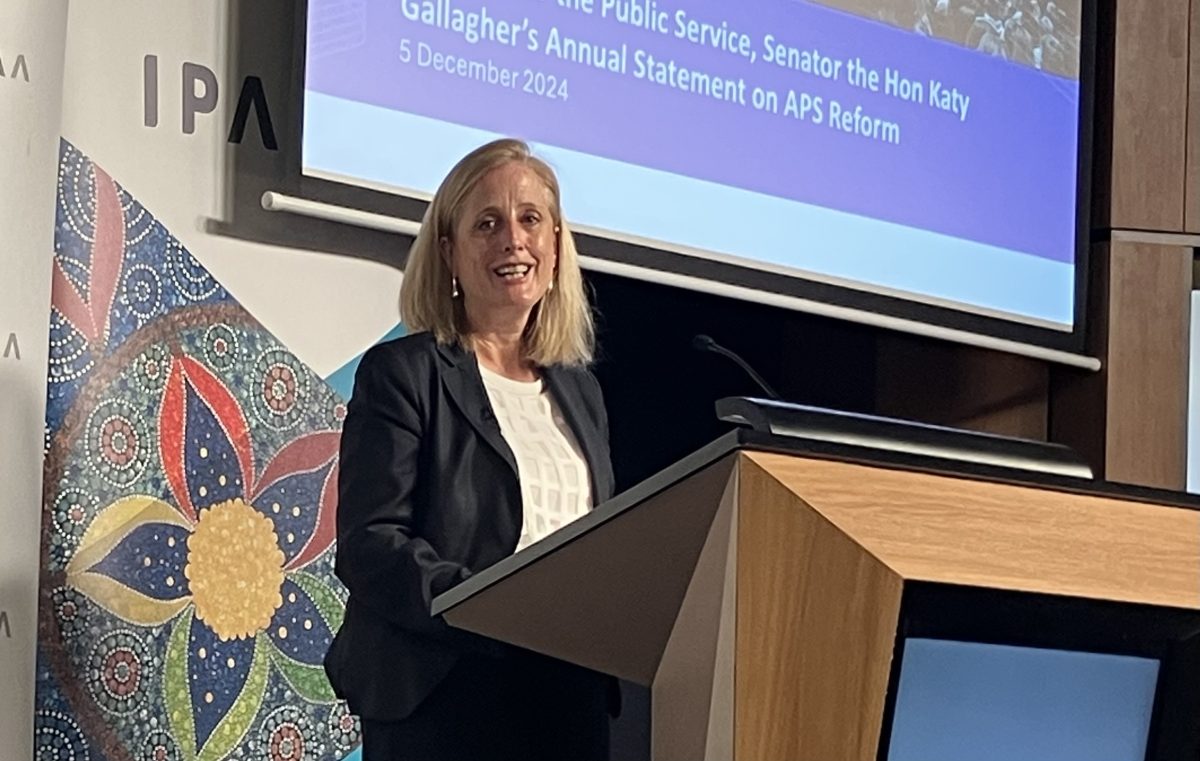
Public Service Minister Katy Gallagher delivering her annual update on APS Reform. Photo: Region.
The Minister in charge of the Australian Public Service expects to see the number of code of conduct breaches reported to continue rising across the APS – and she’s okay with that.
This year’s State of the Service Report 2023-24 revealed a total of 555 APS employees were found to have breached the APS Code of Conduct in the past year, with 61 of them then having their employment terminated.
Across agencies, 647 employees were the subject of an investigation into a suspected breach of the code over the year, resulting in 581 sanctions being applied to 356 employees.
All up, 1369 elements of the APS Code of Conduct were investigated over the year, with 1127 breaches confirmed.
Asked by Region on Thursday (5 December) if that was a concern or just a sign that the government’s reform agenda is working, Public Service Minister Katy Gallagher suggested there is more to come.
“I saw those numbers and they don’t concern me on their own,” Senator Gallagher said.
“We have put a lot of work in, and we’ve had quite a number of lingering investigations over the last 12 months, particularly into Robodebt, where a number of code of conduct enquiries were done.
“The code of conduct process is there for a reason, and it should be used, and we shouldn’t pretend that it’s going to be zero.
“There are different reasons why people get referred and, to be honest, I think we’re going to see more of it.
“The integrity framework around the public service has been developed and is changing, particularly around the anti-corruption commission.
“My sense, post-Robodebt – and I wasn’t in government at the time that happened – but I sense a combination of the Robodebt Royal Commission and the anti-corruption commission and the integrity work we’ve been doing, there is more willingness to report concerns and have them dealt with – which I think is actually a good thing.”
The Minister described Robodebt as the “most extraordinary failure of public administration in Australia” and used her Annual Statement on APS Reform to criticise both the public service and the Coalition government that rolled out the illegal, automated debt recovery scheme.
“Robodebt, the poster child of this false economy and poor culture of a timid and reduced public service, unwilling or unable to stand up for itself against the instructions of the executive government of the time,” she said.
“From Opposition, we [Labor] saw some of the obvious problems across the APS and we made no secret of our plans to reinvest in the public service and to seek to repair that damage.
“Under the Prime Minister’s [Anthony Albanese] leadership, we made specific commitments to rebuild the APS.
“We promised to abolish the staffing cap that had distorted the workforce. We committed to audit government spending and reduce external labour use.
“We pledged to be a model employer, to improve pay and conditions, and to reduce the reliance on consultants and, where appropriate, convert insecure external arrangements into permanent public service jobs.
“Now, these weren’t just campaign promises. They were a recognition that good governance and good government require a strong public service, and as Australia’s population and economy has grown, it follows that we need to continue to develop and grow a fit-for-purpose public service.”
The first pillar of the APS Reform Agenda is ‘Integrity’.
Senator Gallagher said integrity is what was found to be clearly lacking through the Robodebt scheme.
“The Robodebt Royal Commission showed us what happens when integrity systems fail,” she said.
“An illegal scheme that saw innocent Australians hunted down by their own government, threatened with jail times for debts they never owed.
“Robodebt was trumpeted at the time as a $4.8 billion savings measure, but instead the pursuit and illegal persecution of vulnerable citizens delivered a minimum $1.8 billion bill to the taxpayer.
“But Robodebt wasn’t just a policy failure. The tragedy of Robodebt was born out of a system where speaking up was discouraged and independence was compromised, where public servants who tried to raise concern found their voices silenced.
“That’s why one of the most significant reforms to the APS in this term, the Public Service Amendment Act, put integrity at the centre of everything we do … This is about building a culture where integrity isn’t just a word, it’s a part of everyday decision making, where transparency drives better performance, and where our most senior leaders are assessed not just on what they achieve, but how they achieve it.
“These reforms matter because integrity isn’t optional. It’s essential and ongoing to delivering services Australians can trust.”
Original Article published by Chris Johnson on Riotact.








